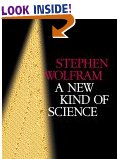A New Kind of Science

Stephen Wolfram's long-awaited book A New Kind of Science comes out tomorrow. More a tome than a book at 1192 pages, and 10 years in the making, it promises to lay out Wolfram's ideas on numerous topics in science, from complexity and cellular automata to the possibility of an algorithmic theory of physics, from free will versus determinism to the nature of
intelligence in the universe.
At my last check, it was the top selling book at Amazon.com. That's amazing. I wonder how long that will last. Either every science geek around is purchasing it from Amazon.com right now, or we have the next hit science text since Stephen Hawking's A Brief History of Time.
I would buy it just to read about his thoughts on complexity, a topic which I can't get enough of these days. Wolfram is a fascinating guy. Brilliant, arrogant, unrepentant. Invented Mathematica, then took all the riches that accrued to the
company which he had formed to publish the software and went off for years and years to write this book.
There's an interesting discussion of Wolfram and his new book in this month's Wired magazine (incidentally, it's the debut of the new Wired magazine layout and format and I dislike it). In it, Wolfram theorizes, taking complexity and emergence to its extreme, that the secret of the universe is a single rule, a simple algorithm, which underlies all the rules of physics and the universe. Furthermore, he claims the rule will be so simple that if we translated it into software code, for example in his software program Mathematica, it would be perhaps three or four lines of code (to give you a sense of the order of magnitude he's thinking of).
It reminds me of The Hitchhiker's Guide to the Galaxy, where they ask that machine what the answer to the universe is and the machine spits out a printout that reads:
42
Anyhow, this is the first "long awaited and discussed" book I'm aware of since The Corrections. It belongs on your bookshelf.
